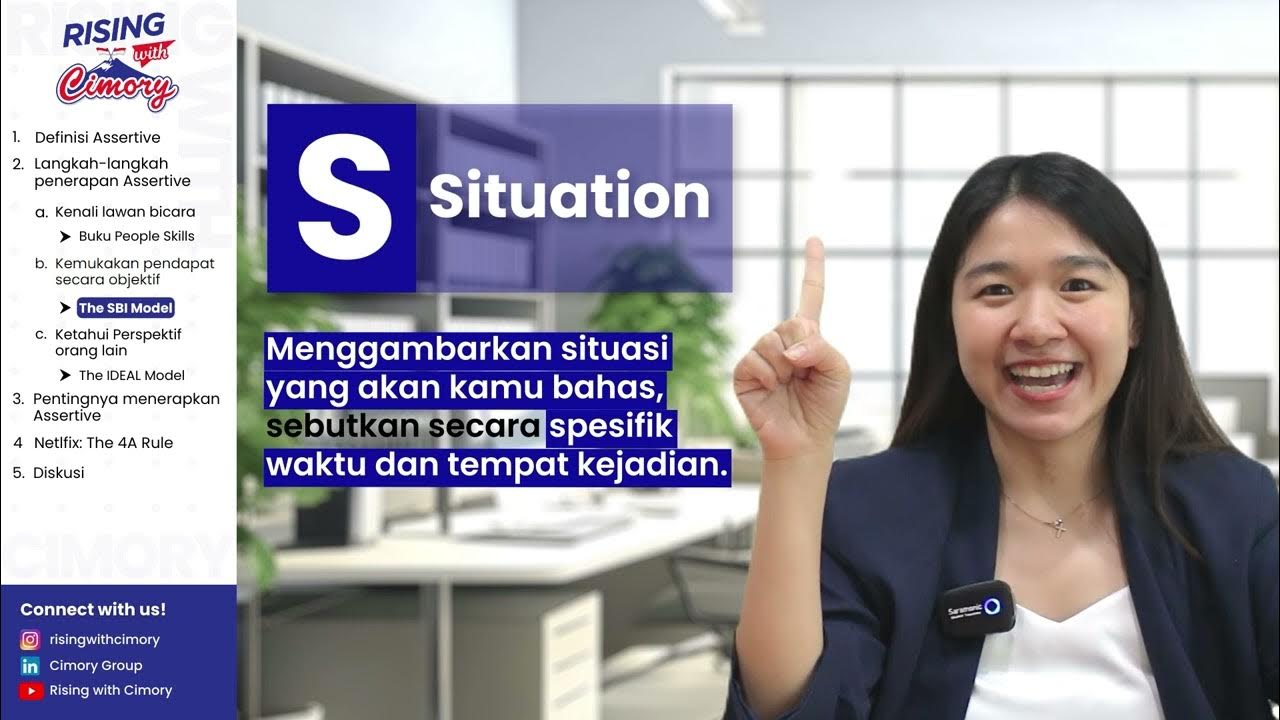M4 L9 Connection through Communication
Summary
TLDRThis video script emphasizes the importance of assertive and effective communication for leaders to foster collaboration and transparency within a team. It outlines key strategies such as using 'I' statements to express thoughts and emotions respectfully, encouraging emotional articulation to prevent misunderstandings, and implementing the SBI model for structured feedback. The script also highlights the significance of leaders seeking and receiving feedback to promote personal and team growth, ultimately building high-performing teams.
Takeaways
- 🗣️ Effective leadership requires fostering an environment of open, assertive, and effective communication within the team.
- 🌟 Leaders should communicate their vision and operational excellence to ensure team alignment and efficiency.
- 💡 Enhancing communication skills is essential for better collaboration, transparency, and conflict resolution.
- 📢 Assertiveness allows leaders to convey messages confidently without being passive or aggressive.
- 👁️ Use 'I' statements to express feelings and thoughts clearly and respectfully.
- 🔑 Practice is key to mastering assertiveness; it involves expressing one's own thoughts, feelings, and needs directly and appropriately.
- 📝 Tips for assertive communication include starting with oneself, naming facts, discussing feelings and consequences, proposing solutions, and confirming agreements.
- 😔 Encourage teams to articulate emotions verbally to prevent misunderstandings and maintain professional relationships.
- 🔄 Feedback mechanisms are critical for personal and professional growth and enhancing team performance.
- 📊 The SBI model (Situation, Behavior, Impact) is a structured approach to providing feedback that is constructive and specific.
- 🤝 Leaders should seek and receive feedback gracefully, using the SBI model to create actionable improvements.
Q & A
What is the key to creating an environment of open and effective communication within a team?
-The key is to foster assertiveness, which allows leaders to convey messages confidently and constructively without being passive or aggressive.
How can leaders communicate their vision and operational excellence?
-Leaders can communicate their vision and operational excellence by expressing thoughts and emotions clearly and respectfully, using 'I' statements to share their feelings and thoughts.
What does assertiveness involve in the context of team communication?
-Assertiveness involves expressing one's own thoughts, feelings, and needs directly and appropriately without infringing on the rights of others, while being honest, straightforward, respectful, and considerate.
What are some tips for leaders to communicate assertively?
-Leaders should start with 'I' statements, name the facts they want to discuss, talk about their feelings and the negative consequences, propose potential agreements or solutions, highlight the positive consequences, and ask a closing question to confirm the agreement.
Why is it important for leaders to be prepared when communicating assertively?
-Being prepared allows leaders to get straight to the point, focus on facts concisely without interpretations, and stay calm, which are all crucial for effective assertive communication.
How can expressing emotions effectively in the workplace contribute to professional relationships and a healthy work environment?
-Expressing emotions verbally helps in understanding each other's perspectives, reducing misunderstandings, and maintaining professional relationships and a healthy work environment.
What is the SBI model, and how can it be used for providing feedback?
-The SBI model stands for Situation, Behavior, and Impact. It helps structure feedback by describing the situation, expanding on the observed behavior, and discussing the impact of that behavior.
Why is it important for leaders to allow time for the other person to self-reflect and respond after providing feedback?
-Allowing time for self-reflection and response ensures that the feedback is received constructively, and the individual can consider the points raised and think about how to improve.
How should leaders seek or receive feedback gracefully when it is provided by colleagues?
-Leaders should show appreciation for the feedback, analyze and think about it, and possibly share what actions they are going to take with the other party, using the same situation-behavior-impact model.
What is the purpose of implementing regular structured feedback sessions in a team?
-Regular structured feedback sessions allow every team member to express concerns, share successes, and discuss improvements, which is essential for personal and professional growth and enhancing the team's overall performance.
Why is it important for leaders to focus on providing constructive and specific feedback, avoiding personal critique?
-Constructive and specific feedback focuses on behaviors and actions that can be changed or improved, which is more effective for personal and team development than personal critique that may not be actionable.
Outlines

Esta sección está disponible solo para usuarios con suscripción. Por favor, mejora tu plan para acceder a esta parte.
Mejorar ahoraMindmap

Esta sección está disponible solo para usuarios con suscripción. Por favor, mejora tu plan para acceder a esta parte.
Mejorar ahoraKeywords

Esta sección está disponible solo para usuarios con suscripción. Por favor, mejora tu plan para acceder a esta parte.
Mejorar ahoraHighlights

Esta sección está disponible solo para usuarios con suscripción. Por favor, mejora tu plan para acceder a esta parte.
Mejorar ahoraTranscripts

Esta sección está disponible solo para usuarios con suscripción. Por favor, mejora tu plan para acceder a esta parte.
Mejorar ahoraVer Más Videos Relacionados

How To Retain Your Best Employees

🔴 [TUTO] GESTION DE CONFLITS EN ENTREPRISE ? LA BONNE METHODE ? 😡🤝😡 #Startup

6 Steps to Building a Collaborative Team Environment | Enhance Teamwork and Productivity

How Leaders Build Trust In Teams

Collaborative: Assertive

修羅場を乗り越えるためのマインドセットとは/修羅場はピンチではなくチャンス/本番で学ぶことで胆力を鍛える【井原慶子×仲川げん×細野豪志×髙島宏平】
5.0 / 5 (0 votes)
